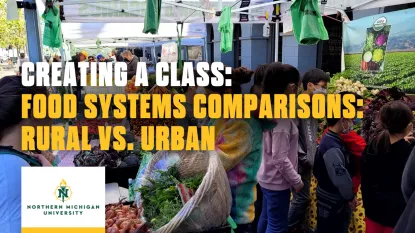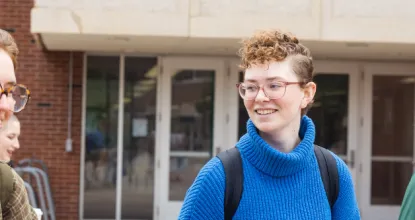
CREATING A CLASS: FOOD SYSTEMS COMPARISONS: RURAL VS. URBAN
Dr. Lanae Joubert, Associate Professor of Nutrition, tells about how the class HM/HN 495 Food System Comparisons: Rural vs. Urban started as an idea and became a fully available class.
Read more below
I have been thinking about creating a course like this for years! It started with some brainstorming and considerable thought towards how health professionals are an integral part of a food system, but often don't get exposed to food system curriculum in their training. For sure food insecurity is addressed, but without a multifactorial lens to focus on and address the real issues. As an associate professor of nutrition and teaching to a variety of NMU majors, how could I play a role in preparing students to take an active part in their own food system?
Everyone eats, but only a few students take a course that has something to do with food. How could I get even more students involved? I looked at courses already being taught across campus that had anything to do with food or food systems. I also thought about what was missing from my early curriculum when I got really interested in nutrition as a student-athlete. Being an avid eater myself, a registered dietitian with a PhD in Nutrition and Food Management, and a student in higher education for nearly 16 years, I never once took a course on how food was grown, harvested, processed, or distributed. If I could have taken a course like the one we have designed, early-on during undergraduate studies, I would have had a better sense of how my choices impact my community and the globe. One becomes a more engaged citizen by recognizing how food is grown, harvested, and by whom (the humans involved), their rights, and the inequalities that currently exist in the food industry/system. The idea of engaging students with their food choice within a community was accentuated in the experiences I am about to describe next.
I had the fortunate opportunity to assist one year and co-teach a second year the HN/NU 386 course titled "Interdisciplinary Study - Global Healthcare, Latin America" in 2017 and 2018. Both trips included fun food experiences. The first year we took a cooking class where students learned how to make Belizean rice and beans, potato salad, chicken stew, and fried plantains. Students seemed to get really excited when they had to compete by slicing plantains into even planks with sharp cooking knives. The best cut plantains won bragging rights. The second year, students learned about the cacao plant and the chocolate making process. They opened pods, removed beans, learned about the fermentation and roasting process, and then prepared their own hot chocolate. Both years students also hosted a booth at the local market, which is like our Farmer's Market, but with many more artisan craft vendors than Marquette's. Students were in charge of teaching/sharing nutrition/health information with the local people. We also visited rural villages and set up health clinics where I became acutely aware of some of the Belizean food system obstacles, like clean water, refrigeration, and access to food. These experiences forced me to think even broader than I had prior; instead of examining our own community's food system, why not compare it with a foreign community's food system?
Upon my return home from Belize May, 2018, I began exploring international opportunities using a faculty led study abroad platform where students would be able to compare and contrast food systems home and abroad. I stumbled upon a few agencies on the internet that specialize in FLSA programs to learn who was doing what and how. Somehow I landed on Italy! I mean, why not? The food is fantastic, it's surrounded by Sea, and I was privileged to have previously visited in the late '90s so I was sort of familiar with the geography and had read a lot about their food system obstacles and celebrations. Settled on Italy as a location, in the summer of 2019 I purchased a plane ticket for travel in May of 2020 that would accomplish 2 goals, (1) take my mom to a place she has always wanted to visit and (2) do some research for my course to consider where I could bring a group of students to examine their food system and visit with stakeholders.
Then, queue the violin, COVID came along and my trip was cancelled. There was a big pause in considering teaching this course at all. But as travel restrictions eased I considered the idea of traveling to a place within the U.S. since foreign travel costs seemed to be unpredictable, even in 2021. A large portion of the food that reaches the U.P. comes from California and since my first college experience was also in the San Francisco Bay Area, I thought it had potential. It seemed plausible to examine/compare and contrast the humans and agencies involved in the northern California food system and compare them with Marquette/U.P. Even when a few time zones are crossed, humans gain perspectives, increase their cultural competence, and become empowered to be active participants in a globalized world.
Since more perspectives are better than one, I reached out to colleagues to share my ideas, asked for input and support. The Associate Dean of the School of Health and Human Performance, Dr. Liz Wuorinen has been uber supportive of this goal of mine, as a cheerleader and I consider her to be an ultimate student supporter. She instantly thought it was a good idea. I also reached out to Loganne Glenndening with an email to get coffee and chat about 'something' during finals week of the Winter 2021 semester. She immediately jumped in with enthusiasm, offering different perspectives and fantastic ideas that unfolded over the following year and a half to truly shape this new special topics general Education Social Responsibility in a Diverse World course. I applied for funding from the College of Health Sciences and Professional Studies in the fall of 2021 to allow us to meet with food system stakeholders in California in May of 2022. Rebecca Tavernini wrote an excellent article summarizing our experience in Northern Magazine, fall 2022 issue. We had hoped to be ready to offer the course for winter 2023, but with the physical move of HM to the Northern Center last year and our desire to get the course approved by the GEC first, we decided it would be best to wait to offer the course Winter 2024 with the immersion travel portion to occur May 5 - 14, 2024. The course was approved by GEC on February 20, 2023.
We are diligently working on the final touches and will be hosting 3 information sessions this fall to inform students about the new course: Sept. 25, Oct. 19 and Dec. 2. There will be an additional cost due to the 9 days of travel and we estimate this cost to be somewhere between $2,000 - $2500. This will cover airfare, lodging, ground transportation, most meals, and planned experiences. Details are still being confirmed, but some of these experiences include viewing urban gardens and indoor agriculture, meeting with stakeholders that help others overcome food system obstacles, camp and contribute working on an organic farm, shop farmer's markets, tour the UC Davis Student Farm, eat at a fine dining 'farm-to-table' restaurant and hopefully much more!
